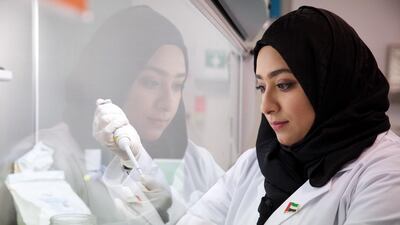DUBAI // A project has been launched to determine whether Emiratis have a genetic predisposition to drug addiction.
As part of her doctoral degree for the University of Western Australia, Emirati Hiba Al Bloushi is studying the genetics of 250 patients at the National Rehabilitation Centre.
About 80 per cent of this sample are users of opioids – drugs, including tramadol, that produce effects similar to opium.
Ms Al Bloushi said that she had observed “a significant pattern of misusing prescription medication” that was an “alarming, growing trend among youth”.
The study identified three genetic variants associated with drug addiction, although more research is required to investigate the role of these variants.
Next, the study will be replicated among other populations to validate the UAE results.
Ms Al Bloushi said there had been a “dramatic increase” in drugs cases in the past five years.
“More importantly, there is a rise of reported incidents involving the misuse of prescription medication, such as tramadol and other painkillers,” she said.
“I hope to provide a new insight to genetic factors contributing to drug addiction in the UAE population that could improve understanding of the disorder. These factors could be predisposing individuals to addiction, or it could contribute to better treatment outcomes.”
The project is being supervised by the director of the biotechnology centre in Khalifa University, Dr Habiba Al Safar. She agreed it was a much-needed area of research.
She said drug addiction involved “environmental and genetic influences”.
“Most studies show that 50 per cent of your risk of becoming an addict is linked to your genes,” Dr Al Safar said. Because the Emirati population was “very heterogeneous” it made it “an ideal population in which to study multifactorial diseases”.
Alcohol and drug addictions were “chronic brain diseases” and hence had “a strong genetic factor”, Dr Al Safar said.
Identifying ethnic and genetic links “may lead to more accurate matching of individuals to different treatment options” and identify “people at high risk of relapse who require more intensive intervention”, she said.
Dr Ali Al Marzooqi, public health and research director at the National Rehabilitation Centre, said that the research would have a major effect on the way the centre treated patients.
Admissions to the centre, the largest of its kind in the country, showed “sharp increases for those seeking treatment and for patients referred by the legal system since services were expanded, particularly in 2009, and has been steadily on the rise since”, said Dr Al Marzooqi.
“The most alarming shift in drug use is that the age of patients for addiction is going down. We are now treating patients in their 20s, while before 2009 the average age was in the late 30s and early 40s.”
The number of substances abused is also on the rise.
“Where we used to treat alcohol and single substance abusers, now most patients abuse a multitude of drugs at the same time – the most prevalent is prescription drug abuse,” said Dr Al Marzooqi.
While there has been an awareness campaign “awareness by itself is not enough”, Ms Al Bloushi said. “Research needs to investigate the factors to drug addiction. Also, there is a lack of scientific research of mental illness in the region, including drug addiction, that is needed in order to quantify the magnitude of the problem.”
mswan@thenational.ae

